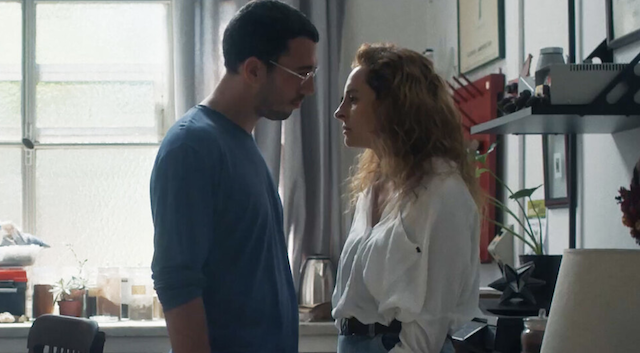
It’s in the common things we come across daily that life happens, not among the grand gestures, the dramatic moments, decisive turning points or splendid vacations. Although many yearn for the smell of freshly cut grass on the other side of the fence – if only a small or big change takes place, life would improve, the grass would be greener.
This is what director and screenwriter Celina Murga examines in her The Freshly Cut Grass, with Martin Scorsese serving as executive producer, where she portrays two 40-something professors at the same university – one man and one woman- each married with two children having affairs with attractive graduate students – and how the consequences for a woman and a man can differ.
She does it with an extraordinarily nuanced original structure asking complicated questions about gender, lust and family – without morally judging anyone involved. Her film won best screenplay at Tribeca Festival in the international narrative competition.
On one hand, the film focuses on Pablo (Joaquín Furriel), a male agronomic professor at a university in Buenos Aires, who is married with two children and is experiencing a period where he is questioning his life and role as husband, father and teacher. As in a mirror, Natalia (Marina de Tavira, Oscar nominated for Alfonso Cuarón’s Roma, 2018), a female agronomic professor at the same university, is in a similar mid-life crisis.
They both have pre-teen children: Pablo two boys, Natalia two girls. Very similar, yet distinctly their own, both live with a loving wife and husband with whom they have tensions. They both embark on a sexual relationship with one of their students. Their lives weave together in two parallel stories, so seamlessly back and forward that you hardly notice. Yet at no point are they interwoven.
The strains in Natalia’s marriage are revealed in a long scene in the bedroom, naturalistically depicted in the beginning. Irritation arises when she and her husband Hernán (Alfonso Tort) start to discuss injustices against women at his job interviews and about the new garden and what to plant. He tries to have sex.
She doesn’t want to. They decide to watch a movie, but not even that works. They argue, she stands up, packs her bag and leaves – apparently, she does this frequently. In a parallel scene in the bedroom, but much shorter, Pablo asks his wife Carla (Romina Peluffo) about her job interview as she responds with frustration that they’re only looking for men. He quickly starts to complain about his own bad work position. She tries to get some affection in a hug. He rejects her.
Throughout the film, Murga are observing these kinds of situations and various matters about gender, always subtle and authentic, The couple both snipe at each other in everyday life. It seems harmless, but means a lot, demonstrating how love and affection can fall out when routines of family life take over. They are both in a similar deep crisis, going on the same journey thinking, consciously or unconsciously, that an affair would be a solution for the frustration.
Murga seems to be interested in asking what makes a man and a woman equal and what is expected of their gender, whether it comes from outside in the society or not. Both of their students, the nerdy hunk Gonzalo (Emanuel Parga) and the punk-bohemian Luciana (Verónica Gerez) initiate the affairs, and none of the protagonist resist. As the relationships continues and the married couples experience them with both doubts and joy, Murga mirror the small differences without stress or overly dramatize them.
Pablo rarely shows emotions, even when things heat up. The consequences of his action are minor compared to Natalia’s – but her cost seems to benefit her as well. Mexican actor Marina de Tavira (the other splendid actors are from Argentina and Uruguay) has a meatier role than Joaquín Furriel. More expressive, more emotions – like her international breakthrough in Roma, she nails it.
The fact that executive producer Martin Scorsese saw greatness in Celina Murgas filmmaking at an early stage comes as no surprise – Murga is an original storyteller. He held the same credit on Murgas previous Argentinian films The Third Side of the River (2014) and A Week Alone (2008). Scorsese admires many talented directors and often stands as executive producer, in the likes of Italian auteur Alice Rohrwacher’s Happy as Lazzaro (2018), Croatian Antoneta Alamat Kusijanovic’s Murina (2021) and British Joanna Hogg’s The Souvenir films (2019, 2021) and The Eternal Daughter (2022).
Murgas modern romance and family life is linked to how social media infiltrates our lives – their infidelities are being revealed by photos spread on social media. She also seems to suggest that sometimes adultery can be a step for married couples to move into new territories and how it re-evaluate marriages, without saying that it’s the solution or favor open relationships. Or perhaps she simply wants to stress that freshly cut grass smells best in your own garden.
Grade : B+
If you like the articles, share your thoughts below!
Check out more of Niclas’ articles.

